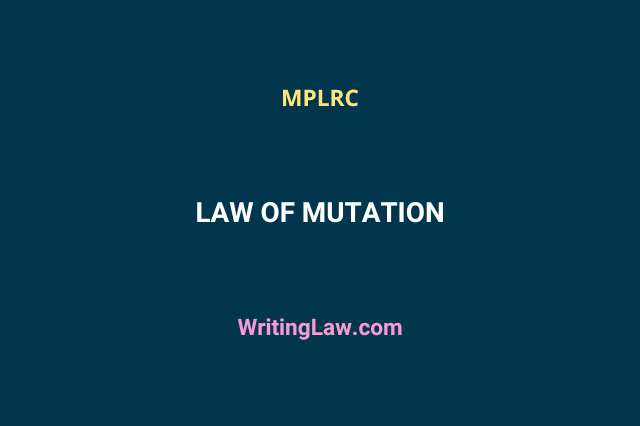
Whenever any person lawfully acquires any right or interest in the land, it is essential to update the land records. To update the land records, it is the duty of the person lawfully acquiring the right or interest in land to report his acquisition of such right within six months to Patwari (in non-urban areas) or Nagar Sarvekshak (in urban areas).
In this regard, section 109 of the Madhya Pradesh Land Revenue Code, 1959 (MPLRC) provides that it is required to report the acquisition of a right or interest in any land. Further, the procedure is provided under section 110 of MPLRC.
The term ‘mutation‘ refers to a change or to alter and officially change a land record for a purpose. In other words, mutation of acquisition of rights refers to officially upgrading the land records when any person acquires any right or interest in any land.
Procedure for Mutation of Acquisition of Rights in Land Records
Section 110 of the Madhya Pradesh Land Revenue Code, 1959 provides for the procedure for mutation of acquisition of rights in land records.
The procedure starts as follows:
1. Patwari (in case of non-urban areas) or Nagar Sarvekshak (in case of urban areas) under section 109 of MPLRC shall register for the purpose of every acquisition of rights reported or noticed to them.
2. Patwari or Nagar Sarvekshak then must intimate about the reports regarding acquisition within 30 days of such report or notice.
3. Duty of Tahsildar: Tahsildar/Tehsildar, on the receipt of information, must perform the following works within 15 days from the receipt of information:
- Register the case in his court.
- Issue a notice to all the persons interested, other persons and authorities.
- Display a notice on the notice board of his office and publish it in the village or sector.
4. The notice that was given to the persons interested by the Tahsildar can now lead to two situations: undisputed matter or disputed matter.
5. In case of an undisputed matter (which means no objection has been raised by the persons interested or other persons or any authority), the Tahsildar will give them a reasonable opportunity to be heard and will conduct the necessary inquiry as he thinks fit and must pass the order of mutation within 30 days (or maximum within two months in total).
6. In case of a disputed matter (which means objection has been raised by persons interested or other persons or any authority), the Tahsildar will give them a reasonable opportunity to be heard and will conduct the necessary enquiry and must pass the order of mutation within five months (or maximum within six months in total).
7. In both cases, the Tahsildar will update the village Khasra, sector Khasra, or land records.
8. Further, it is the duty of the Tahsildar to supply a certified copy of the order passed by him and shall also supply the updated copy of land records to the parties within 30 days from the date of the order of mutation.
9. If the Tahsildar fails to supply the certified copies, then the Tahsildar must record the reasons for not supplying the certified copies and report to the Sub-Divisional Officer.
10. In case the proceedings under section 110 of MPLRC are not disposed of even in the maximum specified period of time, that is, within two months in case of an undisputed matter and within six months in case of a disputed matter, the Tahsildar must report the pending cases to the Collector.
Note: No ex-parte decision can be made under section 110 of MPLRC.
Conclusion
The purpose of section 110 of MPLRC is to ensure and update all the documents related to land and its records.
For this purpose, Patwari (non-urban areas) and Nagar Sarvekshak (in urban areas) ensure that the report on the acquisition of rights must reach the Tahsildar. On such intimation, the Tahsildar ensures the registration of the land records.
- What Is Anticipatory Breach of Contract Under Contract Act? - 13th July 2024
- Who May File Written Statement (With Its Time Limit and Rules) - 31st May 2024
- Who Is a Legal Representative? - 30th May 2024







